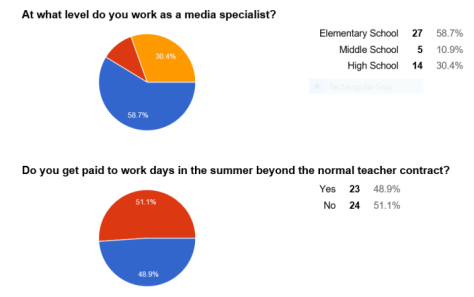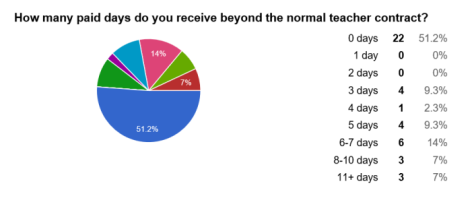We asked and you answered! Our questions about Extended Contract Days drew many great responses from school media specialists. Thank you for taking the time to weigh in! In this post we summarize responses from those questions.
Original poll on Extended Contract Days
Comments/Additional Feedback:
~Our secondary media specialists have 10 day extended contracts. We at the elementary level have been told it is because their buildings pay for them. At the elementary level we have higher circulation of library books, as much technology, and less staff people. Interesting right!
~Your survey is flawed. I work in a K-12 school and that isn’t an option. Not all schools are just elementary, middle or high school.
~The question doesn’t allow me to pick both middle school and high school, but I work in a 6-12 building.
~Extra contract days vary in our district depending on the grade level: elementary, middle, high school all have a different number of extra contract days.
~This practice went away in the Buffalo-Hanover-Montrose Schools about 25 years ago.
~We are a k-12 building and I oversee both the elementary and high school library. In addition, I am the technology coordinator for the district. I just contracted for a 215 day contract that will be addressed on a year by year basis.
~In the district I worked prior to the position I’m in, 8-10 extra contract days were on the schedule. It was amazing, and much needed for budget, planning, teacher development, etc.
~I had a 4 day extended contract k -5 building with 850 students. My administrator and District Media Director decided I no longer needed it. Only the middle school and high school media specialist in our district have a 10 day extended contract. Supposedly, if you work in the secondary you have a bigger work load
~I wish I was paid because I always end up working extra days to complete set up for the school year and the end of year wrap up.
~I don’t work in the summer. What I do get is 1 day of workshop before school starts in the Fall, and 1 day of workshop at the end of the school year.
~Used to have 10 days and now we are cut back to 5 days. Finding it not enough to prepare technology.
~I work in a Middle & High School. I am also the director of tech integration, and my extra days are related to that part of my job. My EA, does not get any extra days, but we lament how we are not prepared at the beginning of the year, and end the year abruptly without things being settled. She needs extra summer days.
~When I started in 1977, I had a 10 month contract. I had that for one year.
~I have five days before the school year starts and five days after the school year ends. I spend more time than that at school, but it is nice to know some of the extra work necessary to be done is acknowledged.
~I get 3 before the school year and 3 at the end, but I could technically use them all at one time.
~I get six days, and it’s not nearly enough. I use them up before the school year even starts and work for free at the end of the year/beginning of summer. I’ve been here five years. The year before I was hired, they changed it from ten days down to six.
~It takes us about 2 weeks into the school year to get everything set up so that kids can even check out.
~We get paid hourly ($26.50) for six days outside the teacher contract.
~Additional days would be nice since I’m working with a full teaching load and still trying to maintain a media program. My ESP hours were cut by my building principal to 2 hours (from 6) this year to increase instructional ESP help in the classroom.That has created a lot of job pressure to keep everything going. We’re relying on volunteers to put away the so far, 20,000 books! I know that this year will be especially trying to wrap up the year and extra days would be greatly appreciated. I had maybe 2 extra days at the end of the year when I first started my Library Media Career in 1980!
~Your poll doesn’t allow for a person who has more than one school library.
~I am only part time and paid an hourly wage.
~Wish it was more like 10-15
~I am the District Library Media Specialist. There are 5 buildings in my district which averages out to 2 extra days per building. I would like to request additional hours this summer, as this will not be enough time for bigger projects at a school (i.e. genrifying, extensive weeding).
~We are also first line of tech. support so much of that time is spent with iPads and other devices.
~I went from 10 days to 6 days 2 years ago
~I keep track of my hours (days) worked during the summer and can use the hours as special leave during the school . If I accumulate a lot of hours I can ask for reimbursement.





 We asked and you answered! Our
We asked and you answered! Our